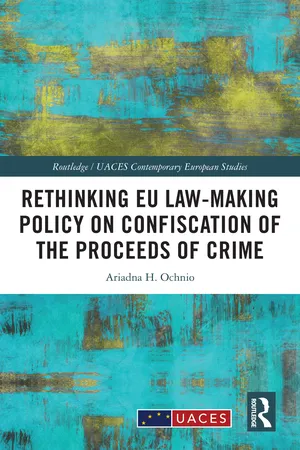
Rethinking EU Law-making Policy on Confiscation of the Proceeds of Crime
- English
- ePUB (mobile friendly)
- Available on iOS & Android
Rethinking EU Law-making Policy on Confiscation of the Proceeds of Crime
About this book
The book provides a critical analysis of EU law-making policy on the confiscation of the proceeds of crime, using a minimalist restorative approach to justice focused on the rights of victims and communities, and more proactive roles for all participants in confiscation procedures.
This book shows how the examined policy has been translated into the EU law standards adopted as its realisation and whether the gaps identified in these standards are reflected in the domestic law of the comparator EU jurisdictions: Poland, Germany, and France. The post-conviction confiscation regime in England and Wales is also explored as an example of an alternative non-EU model of value-based confiscation. Considering the complex juridical nature of confiscation, which challenges the applicability of the civil–criminal dichotomy, this book recommends a twofold approach when shaping EU confiscation mechanisms, focused on linking policy objectives with a restorative approach to justice, and making the appropriate choice of criminal or civil routes for confiscation.
This book will be of key interest to scholars, students, and practitioners in EU policy and law, criminal law, EU and national law on confiscation, EU criminal justice policy, and more broadly to European studies, criminology, and international organisations.
Frequently asked questions
- Essential is ideal for learners and professionals who enjoy exploring a wide range of subjects. Access the Essential Library with 800,000+ trusted titles and best-sellers across business, personal growth, and the humanities. Includes unlimited reading time and Standard Read Aloud voice.
- Complete: Perfect for advanced learners and researchers needing full, unrestricted access. Unlock 1.4M+ books across hundreds of subjects, including academic and specialized titles. The Complete Plan also includes advanced features like Premium Read Aloud and Research Assistant.
Please note we cannot support devices running on iOS 13 and Android 7 or earlier. Learn more about using the app.
Information
Table of contents
- Cover
- Half-Title
- Series
- Title
- Copyright
- Dedication
- Contents
- Acknowledgements
- List of Acronyms and abbreviations
- 1 Introduction
- 2 What can a restorative approach to justice offer to EU law-making policy on the confiscation of the proceeds of crime?
- 3 The evolution of EU law-making policy on the confiscation of the proceeds of crime
- 4 Gaps in EU law standards for the confiscation of the proceeds of crime
- 5 The influence of EU law standards on the confiscation of the proceeds of crime on the normative framework of confiscation in Poland, Germany, and France
- 6 Changing the approach to confiscation: possible implications for other fields of EU criminal justice policy
- 7 How to increase the restorativeness of EU law-making policy on the confiscation of the proceeds of crime?
- Index